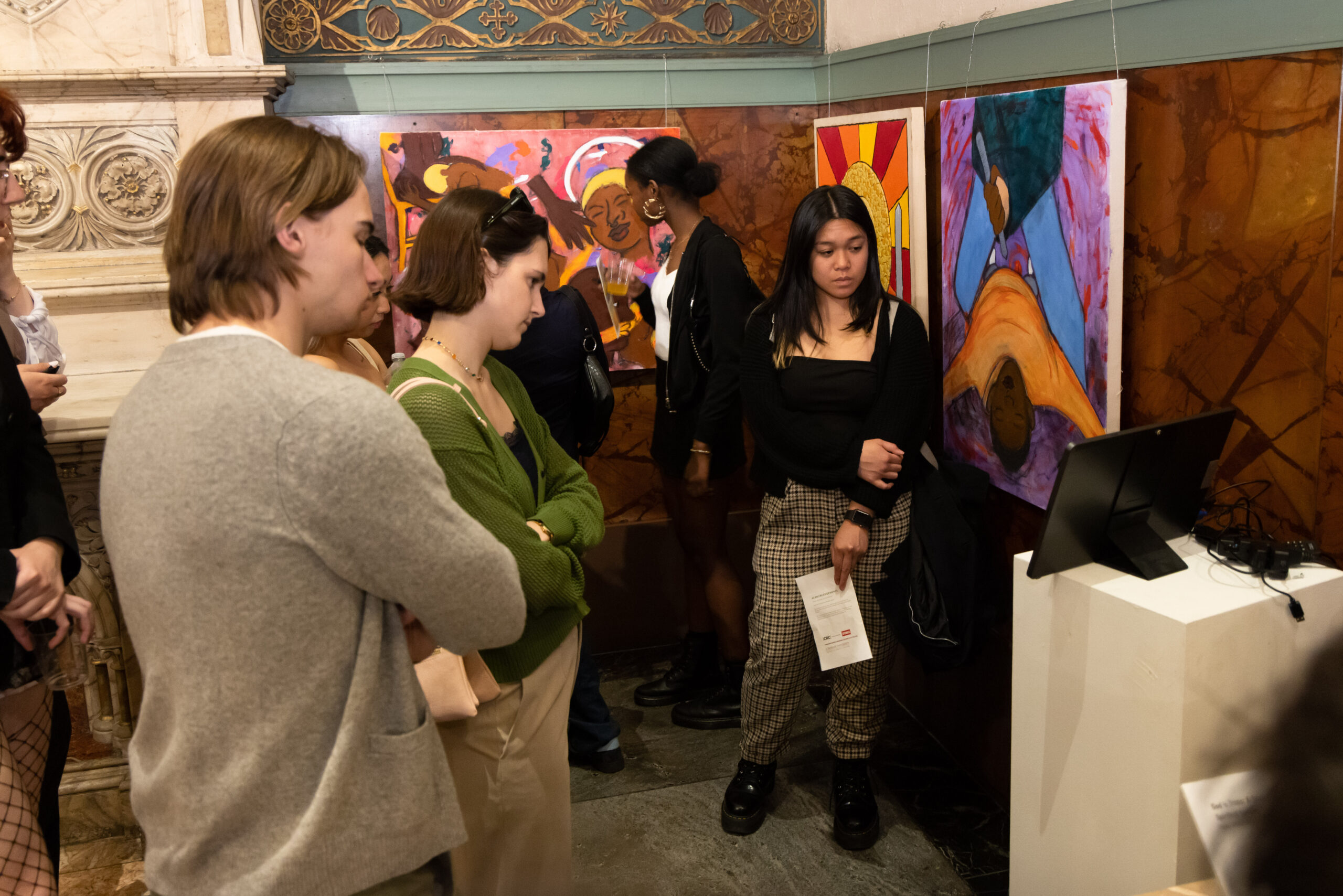Two Sundays ago, I arrived to my Manhattan parish, the Church of St. Paul the Apostle, for the 5:00 p.m. Mass. I was surprised to find members of Tradition, Family, and Property, (TFP), an alt-right Catholic group, forming a gauntlet on the sidewalk outside. They were dressed to the nines in skirts and suits, holding placards condemning queer people.
The traditionalist Catholics were there to protest an art exhibition that included an installation originally titled “God Is Trans: A Queer Spiritual Journey.”
Two weeks prior, some conservative Catholic and secular media outlets exploded with vitriol over the installation’s video, paintings and placard, which were characterized by some critics as “blasphemous.” News sites described my parish as “notoriously liberal” and “ultrawoke,” quoting a nameless parishioner who complained, “’The church should not be promoting this…It seems like they are trying to force the [transgender] agenda on others.”
As traditionalist anger grew, dozens of threatening emails and phone calls targeting parish leaders poured in to the parish office. The archdiocese told the press that it would investigate the artwork. Church staff helplessly watched while parish security officers did their best to keep the building and everyone in it safe.
Through it all, the Paulist Fathers stood as beacons of compassion and dialogue for those deemed unwelcome and unworthy by others.
What was all the hubbub about? How did St. Paul get here?
My parish sits next to the Lincoln Center campus of Fordham University, the Jesuit university of New York. Since Fordham Lincoln Center has limited space on its urban campus, St. Paul often hosts some university events such as holiday concerts and an annual Baccalaureate Mass. The parish enriches the life of the university, and the university enriches the life of the church.
In this case, members of the Duffy Fellows program, part of Fordham’s Center on Religion and Culture, partnered with Openings Collective to host an exhibition of student art titled “Vessel: A Spiritual Art Experience.” The exhibition’s theme focused on “how young people encounter spirituality through their own original art.” It was a good fit given St. Paul’s vibrant ministry with students and young adults.
TFP’s protest was not the first time that the Catholic alt-right has attacked St. Paul, which is well-known for its inclusion of marginalized communities. In June 1993, traditionalist activists stormed the altar and assaulted then-Paulist Father Steven Harris as he was saying the parish’s first Pride Mass. When Father Gil Martinez, C.S.P., was the church’s pastor, the parish came under fire for hosting an exhibit of contemporary Islamic art titled “Brothers and Sisters: Islamic Art/Christian Space.”
Through it all, the Paulist Fathers stood as beacons of compassion and dialogue for those deemed unwelcome and unworthy by others. Time and time again, St. Paul’s open-doors and open-hearts policy upset alt-right Catholics.
The most recent iteration of traditionalist intolerance was a reaction to artwork created by Adah Unachukwu, a Fordham senior who, according to their public LinkedIn profile, uses they/them pronouns and works as an intern for GLAAD, an LGBTQ advocacy group. Unachukwu’s transgender-affirming artistic intervention could not have come at a more fitting time.
Today, as state legislatures and diocesan offices across the U.S. race to silence trans people, it is imperative for people of all genders (or no gender) to amplify trans voices.
Unachukwu mapped the queer spiritual journey using three theologically heavy terms: Sacrifice, Identity, and Communion. For Unachukwu, “Sacrifice” disclosed the queer “need to shed an old life and personhood in order to be able to focus on your spiritual need.”
Echoing Christian themes of conversion and transformation, Unachukwu upset some of the self-appointed watchdogs of Catholic doctrine by claiming, “There is no devil, just past selves.”
Unachukwu’s artwork makes the bold claim that all people—especially trans people—have a share in divine life.
Unachukwu went on to consider “Identity,” which they described as “the most impactful part of the exhibition. What does holiness look like?” Unachukwu asked. “What does your god look like? Are those two portrayals that can be merged?” Here, Unachukwu raised questions shared by many queer folk. How do we understand God in relationship to our queer selves? Do we believe that holiness is within our reach? Can we relate to the divine?
The third element, “Communion,” seemed to answer affirmatively by “placing God and the mortal on the same plane to speak to one another.” Unachukwu acknowledged that knowing God is a fundamental aim of queer spirituality. For them, finding a home in relationship with oneself and one’s God is indeed possible.
As a gay Catholic theologian, I’m most struck by Unachukwu’s honesty, vulnerability and humanity. Through their art, they present questions that all people, queer or not, wrestle with.
Who is God calling me to be? How can I find my true self and move beyond a past that tries to limit me? Where is God at work in my own story, especially when others claim that God is not there? Finally, how can I find my ultimate meaning and purpose—a spiritual home—in relationship with God?
Sadly, it is the humanity revealed by Unachukwu’s spiritual searching that their opponents seek to deny.
Some Catholic traditionalists do not tolerate the search for God outside of their self-circumscribed circles, especially when experiences of God do not conform to white, cis-hetero, and patriarchal ideologies. TFP and many other alt-right Catholics refuse to see the humanity in the trans Imago Dei by denying that trans spirituality has anything to do with the divine.
In doing so, they turn away from the God of Christian revelation—a God who identifies with and intervenes on behalf of the marginalized; a God who, as a human being, befriended, ministered among and brought dignity to the social outcasts of his day; a God who died a criminal’s death in defiance of imperial violence; a God who rose from the dead, bringing new life to those who also suffer and die at the hands of injustice; a God who called Their followers to build radical communities of hospitality, liberation and joy.
Queer spirituality finds its source in a loving God who creates and affirms each person made in God’s image.
Unachukwu’s artwork makes the bold claim that all people—especially transgender people—have a share in divine life. Opponents of the artwork oppose the radical Gospel message that God’s love overcomes all forms of human exclusion.
The church still has much to learn from the message in Unachukwu’s artwork. Queer spirituality finds its source in a loving God who creates and affirms each person made in God’s image. God initiates relationships with human beings who, once beckoned by God, experience profound transformations as they become more and more godlike.
Queer spirituality flourishes when it is grounded in the certainty of God’s intimate identification with the human condition in all its manifold forms. Unachukwu’s God is Trans: A Queer Spiritual Journey is a powerful reflection of the communion that queer folks share with the divine. And no protest will ever be able to take that away from them.



